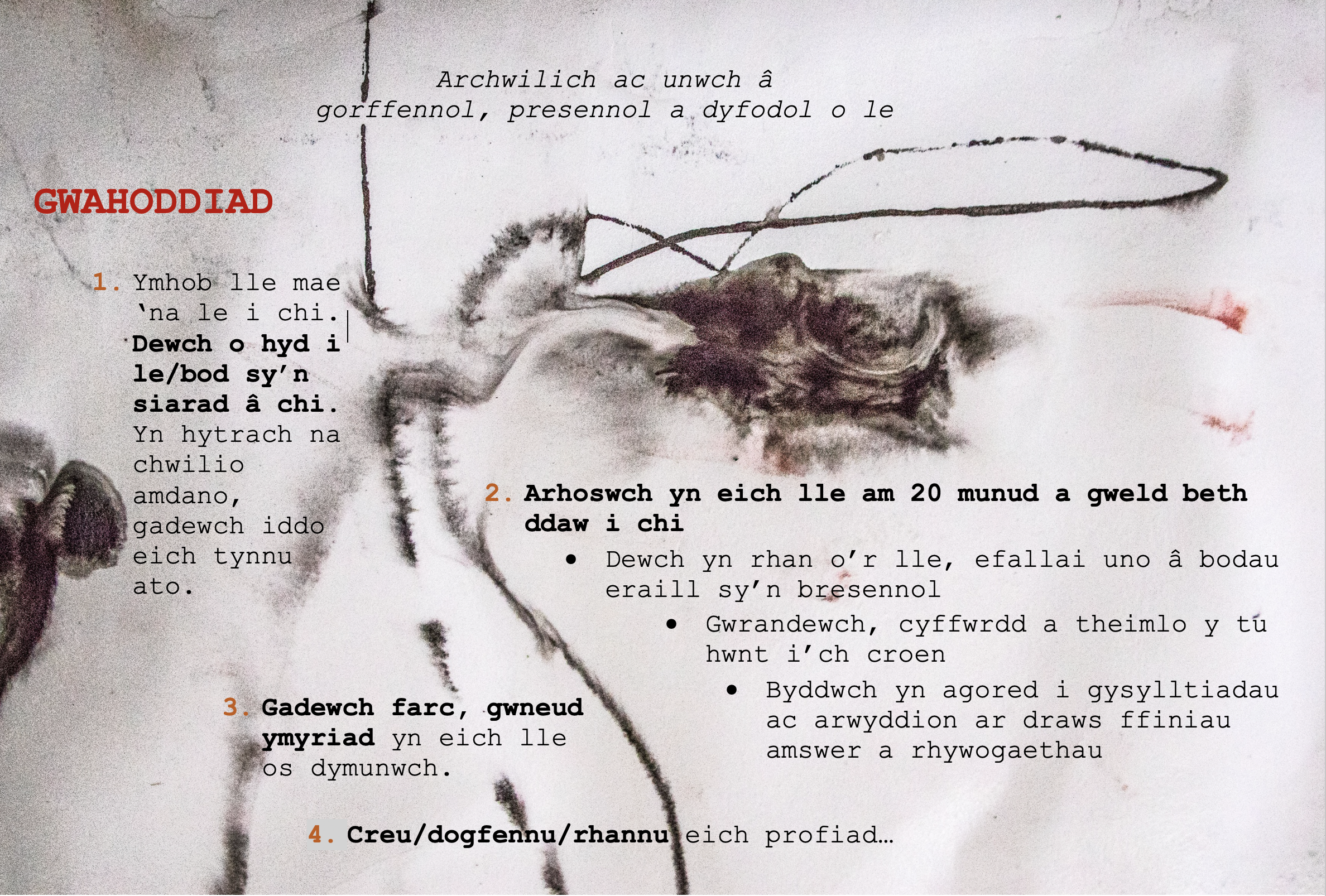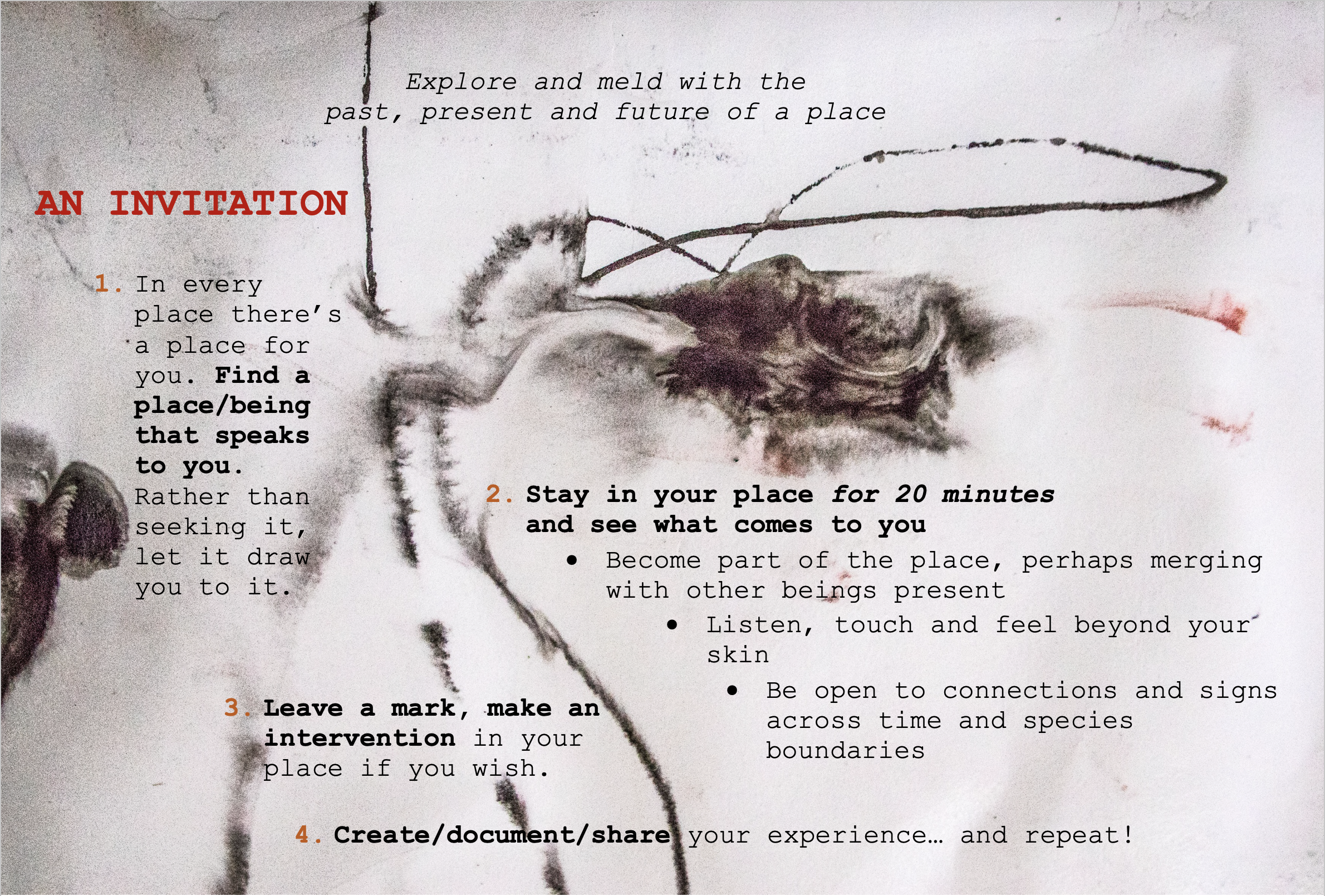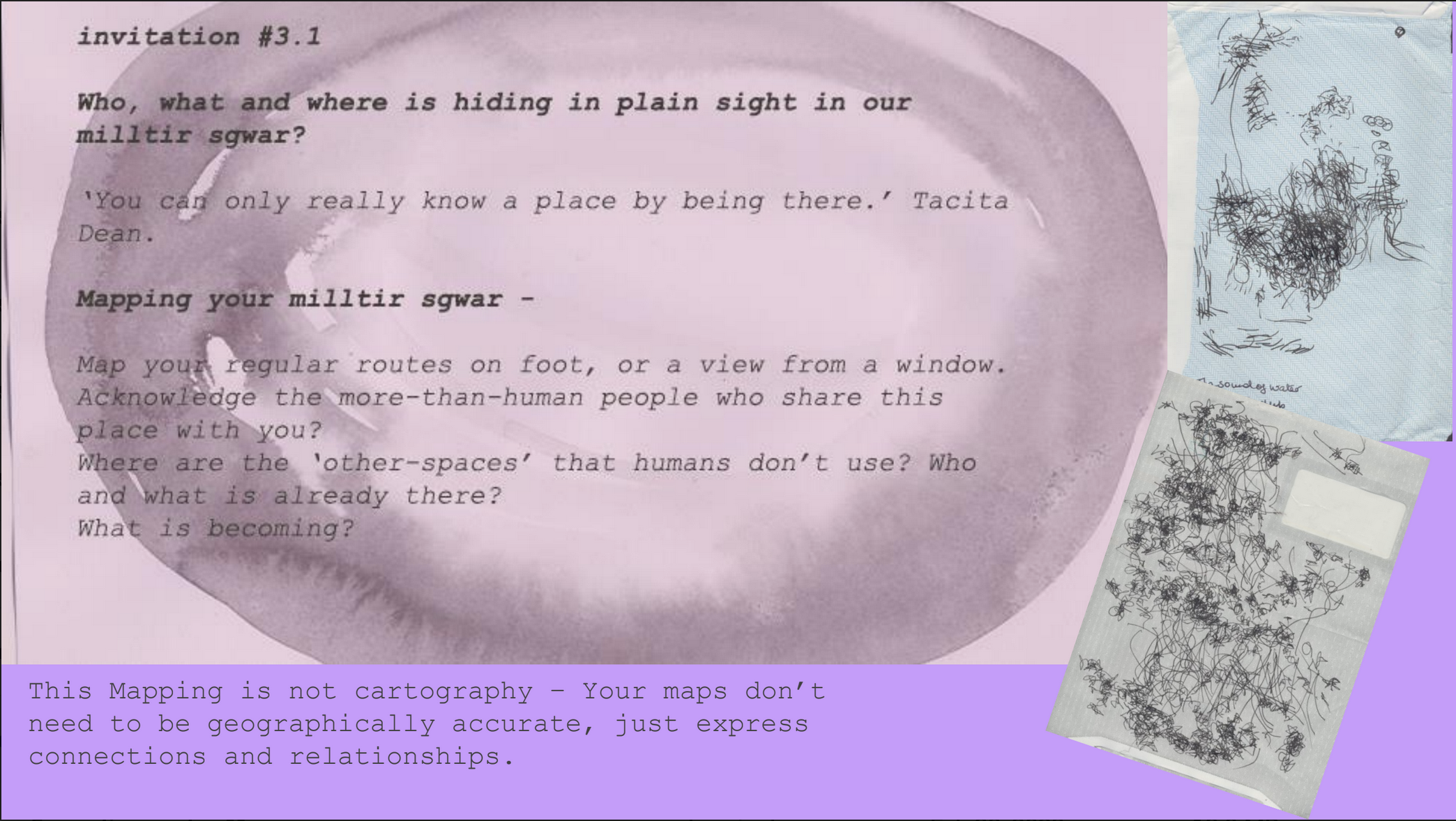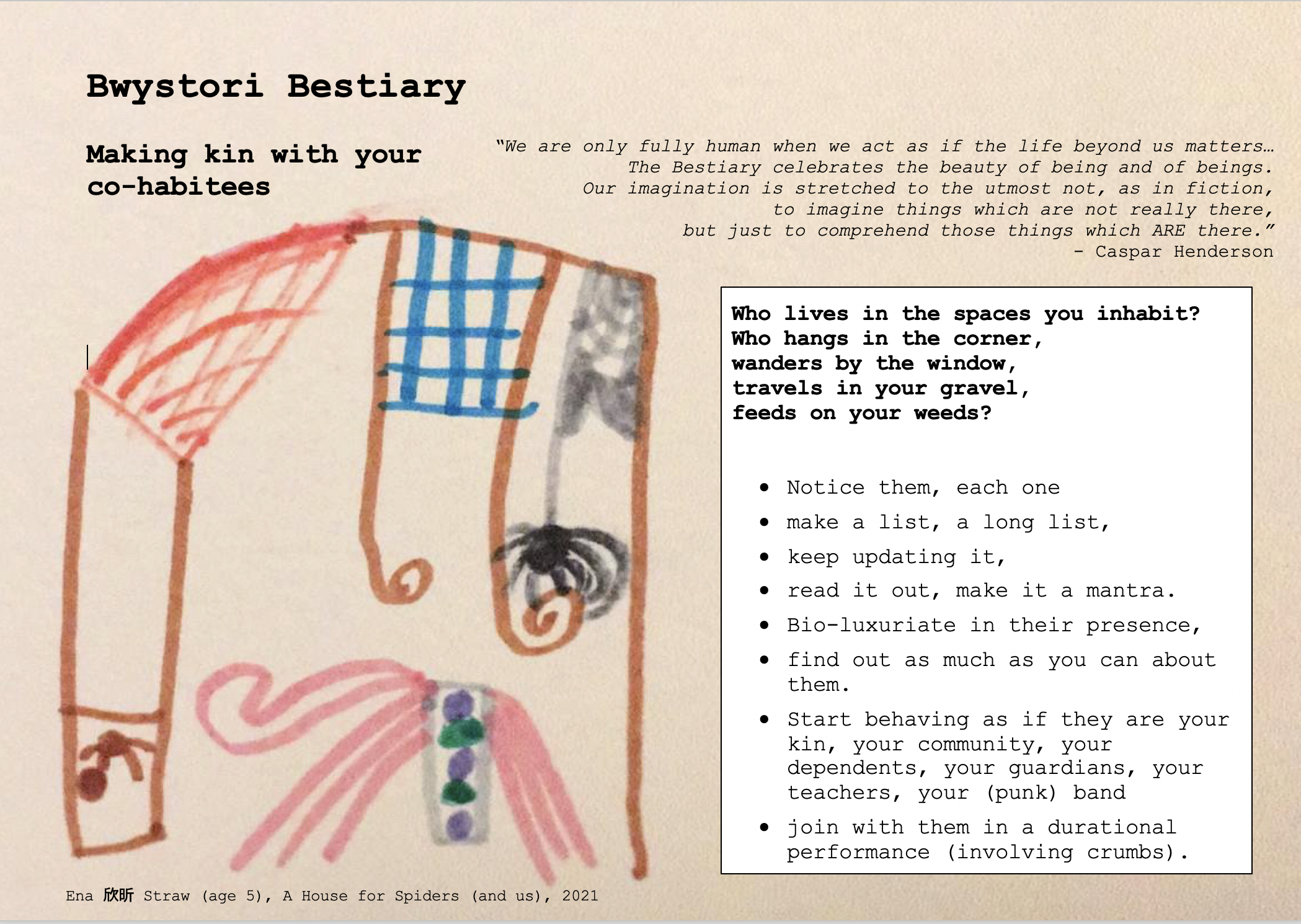
Sgôr boced
Scores for miniature thought experiments
“scores as performance texts allows us to see how writing can activate art/life works that writing cannot contain or control… those works that somehow contain (if that’s the word) the performance in the text itself — not as a document or as performative utterance per se, but in the way that poetic writing can make something happen in the world, even if that ‘in the world’ is only in the reader’s brief imagining of potential enactments”
Mae Utopias Bach yn datblygu gwahoddiadau a ‘scores’ fel ffordd o strwythuro ein digwyddiadau a'n gweithgareddau. Dan ni hefyd wedi defnyddio'r rhain gyda sefydliadau celfyddydol ffurfiol a Phrifysgolion yn ogystal ag yn ein cyfarfodydd ein hunain.
Utopias Bach develops invitations and scores as a way of structuring our events and activities. We’ve also used these with formal arts establishments and Universities as well as within our own meetings.
Yn gynnwys // These have included:
Ail Ddychmygu’r Oriel - Reimagine the Gallery
Maniffesto o Le - Manifesto of Place
Trawsffurfiad - shape shifting
Ysgol Arbrofol Dod yn ôl at Ein Coed: Treesense Experimental school
Sgwrs Chwilgar - a curious conversation
Gwahoddiadau Utopias Bach Invitations, an exhibition at Galeri, Caernarfon (June - 5 July 2023) brought together some of these invitations and responses to them.
Mae'r dudalen hon yn cynnig rhai o'n sgoriau ni - a rhai rydyn ni wedi'u canfod - i chi roi cynnig arnyn nhw gartref // This page offers some of our scores - and some we’ve found - for you to try at home.
Maen nhw wedi'u trefnu mewn 4 adran // They are arranged in 4 sections:
Dychmugu Radical Imagining
Sylwi - Noticing
Gwneud Tylwyth - Making Kin
Arallweddu - Becoming Other
Dychmygu Radical Imaginings

Plant Canthrig // Children-of-Canthrig
Roedd Canthrig Bwt, cawres neu wrach oedd yn byw yn Nant Peris. Mae rhai'n dweud bod ei stori hi'n wreiddiol o 400 OC.
Ymunwch â ni i archwilio beth mae'r stori hon yn ei ddweud wrthym am orffennol, presennol a dyfodol dyffryn Dyffryn Peris … a sut y gallem ailddychmygu ac ailadrodd y stori?
Canthrig Bwt was a giant or witch who lived in Nant Peris. Some say her story is originally from 400 AD.
Join us in exploring what this story tells us about the past, present and future of this valley of Dyffryn Peris … and how could we re-imagine and retell the story?
Seran Dolma, Wanda Zyborska, Lindsey Colbourne, for Stori’r Tir
Qwilt Utopias Bach Quilt
The idea of Cwilt Utopias Bach Quilt came from our Collaboratory in September 2023, where, in partnership with Rewilding the Artist, we were discussing how we might embody our Utopias Bach evolving ‘feel, experience, invitation, system, policies, etiquette, cultures’ rather than having a dry set of ‘fixed’ paper-based policies and descriptions.
You are invited to make a contribution to the Quilt, and here is Lisa Hudson’s ‘inclusion score’ to try out.
These will at some point be brought together (or not!) in some way.
“Use your wildest imagination and embrace peace through play”…
Prompts
· Dance with a tree.
· Talk to a flower and write its response.
· Sing with a bird.
· Splash in a stream.
· Draw an imaginary, unseen world that is under a stone, in a tree, at the end of the river.
· Invite the spirits of place to your picnic.
· Sculpt with mud.
· Breath in the air and breath out sound.
· Daydream of a flight with a butterfly.
· Make rose petal perfume.
· Create a collage of how you feel when in nature.
· Create bark rubbings with wax crayons and paper.
· Write a poem to a tree or a bird
· Thank the worms for creating fertile soil and plant a seed.
· Make a nature-based crown.
· Make a bee hotel.
· Draw with a stick.
Sylwi - Noticing
Gan Seran Arianwen
Archwiliwch ac unwch â gorffennol, presennol a dyfodol o le : Explore and meld with the past, present and future of a place
By Lindsey Colbourne, Lisa Hudson and Wanda Zyborska for Maniffesto o le - Manifesto of place
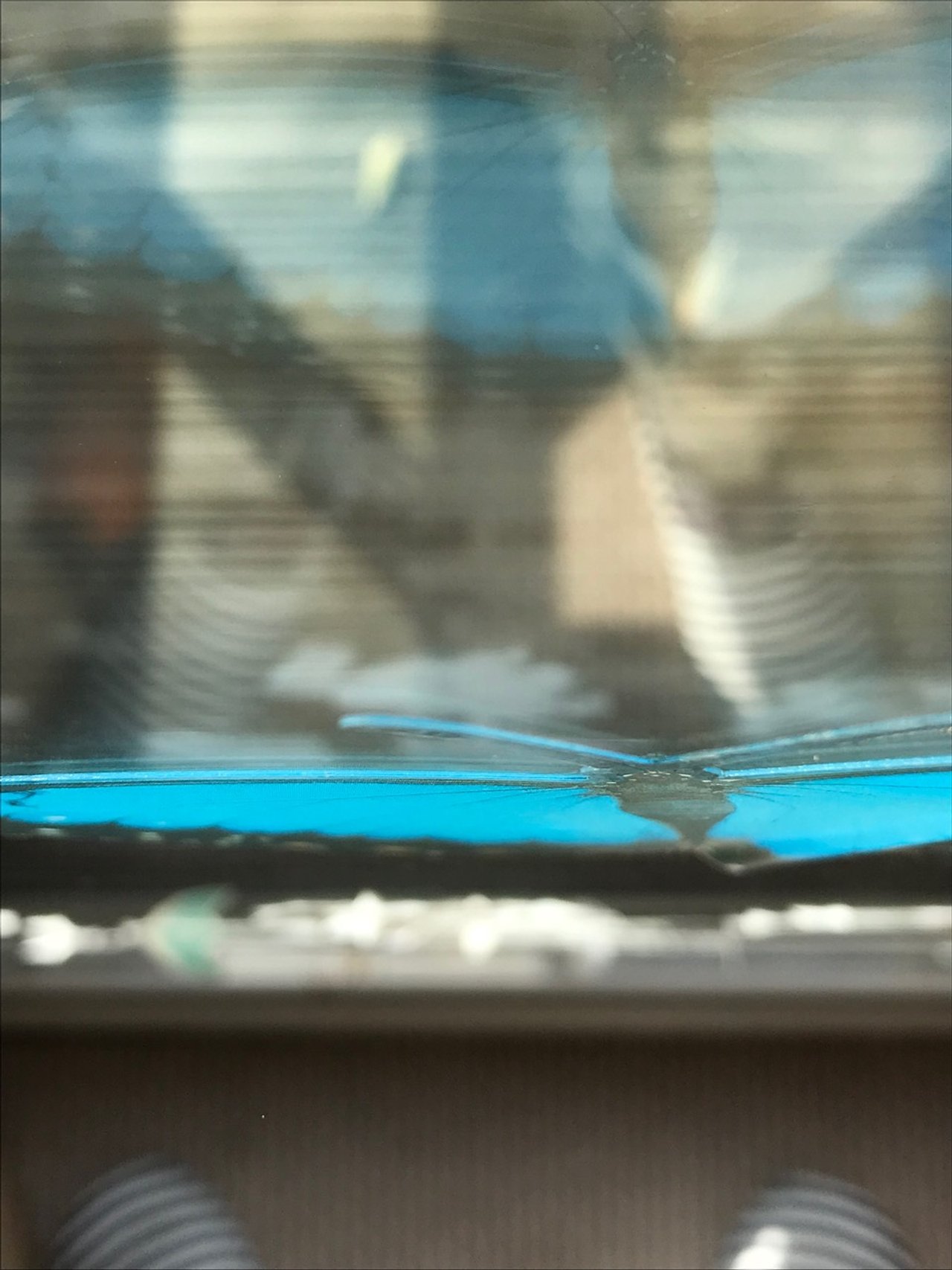
Proposition:
Next time you sense silence, stop. What might appear when other, more prominent sounds are absent? Let your attention wander. Outside, within.
Julie Upmeyer
“Lie down with one ear to the floor and listen carefully. Who and what do you hear? Even if separated by walls and floors, we all share a common ground”
“Next time you see an insect, take a moment to observe it. Follow it wherever it goes and keep a record of your discoveries.”
By Lisa Hudson, for Cwrs Utopias Bach Course
By Lisa Hudson, for Cwrs Utopias Bach Course
Gwneud Tylwyth - Making kin
Gan Sarah Pogoda
(click on button to read scores)
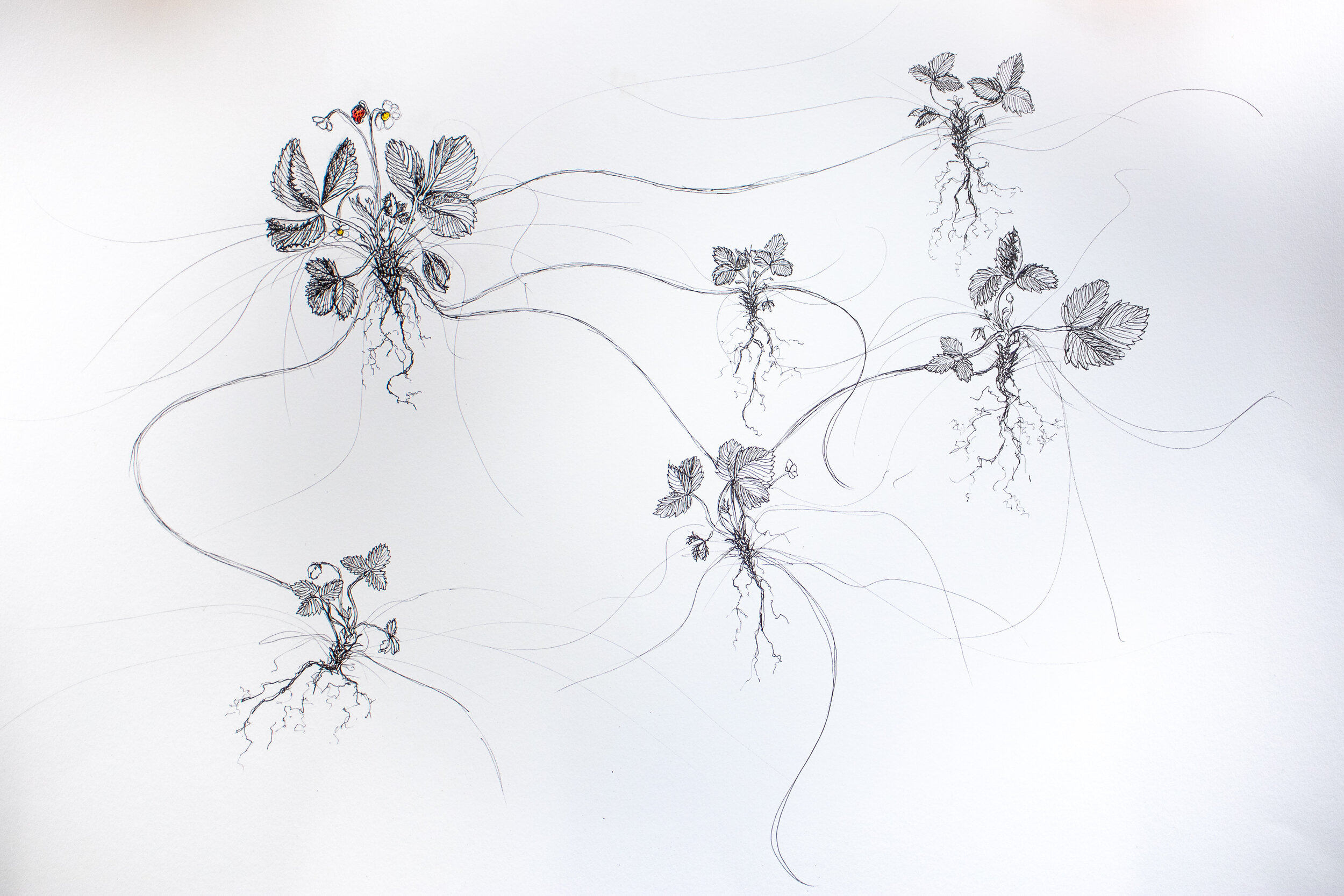
“Move around your home. Or outside.
Think of, greet, and relate to everything you meet as a person
- human person, plant person, tree person, weed person, bird person, stone person”
Lindsey Colbourne
Lindsey Colbourne @ Hildesheim, Germany, 2025
It is so easy to forget that we still live amongst species so numerous we can barely imagine them. And just one of them is human. Could we start to think of ourselves as a ‘keystone’ species, living amongst others in positive, symbiotic, loving relationship?
What if we started to relate to all these species as relatives rather than resources or as problematic interlopers? Might this new (to the predominant ‘’human-centric’ way of thinking) but also ancient way of thinking might be part of the new story we need, to repair our separation from ‘nature’?
So instead of thinking: Resource, crop, quarry, manage, control, study, conserve, boundary, demarcation, competition… we could start thinking: Relatives, flourishing, joy, play, storytelling, making kin, entanglement, uncertainty, rhizomes, connection…
Lindsey Colbourne - Bwystori/Bestiary
Arallweddu - Becoming Other
Kar Rowson
Dod yn ôl at eich coed
“Sut allwn ni ‘ddod yn ôl at ein coed’ trwy gydweithrediadau coed-ddyn dynol?”
“How can we ‘dod yn ôl at ein coed’ through human-tree collaborations?”
The Welsh idiom ‘dod yn ôl at fy nghoed’ literally translates as ‘coming back to my trees’, meaning returning to your roots/senses/a balanced state of mind.
“Sut allen ni ddechrau asio a chysylltu gyda’n cymuned dynol a choedol mewn ffyrdd fydd yn newid ein synnwyr o’n hunain a’n perthnasau?”
“How can we begin to merge and connect with our human and tree community in ways that change our sense of self and kin?”
Egino: Try it - rhowch gynnig arni“Sut allwn ni ddechrau datblygu perthynas gyfartal a chariadus gyda choed?”
“How can we begin to develop equal and loving relationships with trees?”
Sibrwd y Coed: Try it - rhowch gynnig arni“Sut allwn ni fod yn myselium?”
“How can we become mycelium”
Mudiad Mycelium Movement: Try it - rhowch gynnig arni“Sut allwn ni dyfu gyda’n gilydd gyda hen wrach a choed hynafol?”
“How can we become together with crones and ancient trees?”
Crone Cast + Hynafiaid/the Ancients: Try it - rhowch gynnig arni“Sut allwn ni ail-ddychmygu ein perthynas gyda thir a choed ar gyfer cyfiawnder cymdeithasol, amgylcheddol ac atgenhedlol?”
“How can we re-imagine our relationships with land and trees for social, environmental and reproductive justice?”
Cyfiawnder/Justice: Try it - rhowch gynnig arni
Ysgol Arbrofol Dod yn Ôl at Ein Coed Utopias Bach Treesense Experimental School
Sgwrs Chwilgar
Curious Conversation
50 invitations
to explore
‘how to get into
and out of the Cabinet’
Score: Emergent Fluxus State
By Sarah Pogoda
“Surrender, without being defeated, to the pleasure of giving back, of right relationship to place, of redemption, of reparations, of maintenance, care and attending to”
— Bronte Velez
Minor Walk Manifesto
“Often I get asked ‘is it too late?’ The question I have started asking myself is: What would it be like for me to become a human being that causes all other life to thrive? What have I come here for? What is my reason for being here now? What can I do?”
No more waiting.
No more hoping.
No more letting ourselves be distracted, unnerved.
Break and enter.
Put untruth back in its place.
Believe in what we feel.
Act accordingly.
Force our way into the present.
Try. Fail this time. Try again. Fail better.
Persist. Attack. Build.
Go down one’s road.
Win perhaps.
In any case, overcome.
Live, therefore.
Now.
Lindsey Colbourne (2020)
A year of Fluxus-inspired mini-invitations, inspired by lockdown:
10. Hydrefoct
“Throw a ball from your front door.
Use this
to measure the radius of a circle.
Draw a circle.
Find a way to make
the lives of all beings
within that circle better”




